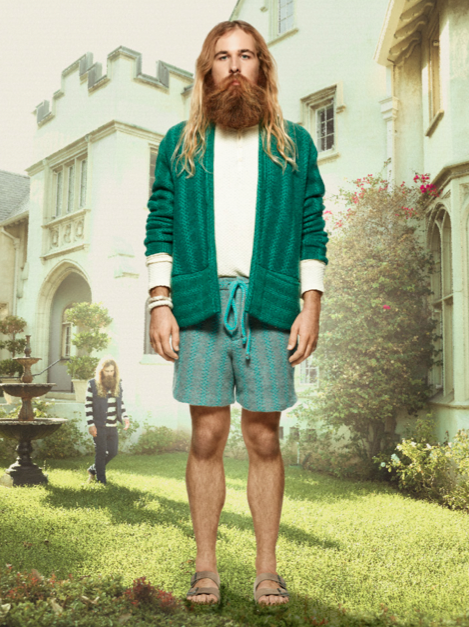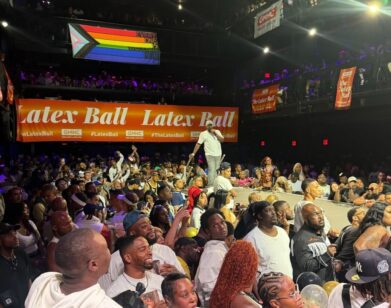Menswear Monday: The Elder Statesman
There’s more to menswear than suits and ties. Every other Monday, we’re giving the fastest developing facet of fashion the attention it deserves and introducing the designers, buyers, trendsetters, and stylists you need to know.
When the CFDA announced that The Elder Statesman had won its annual Fashion Fund competition around this time last year (over contenders like SUNO and Wes Gordon), most reactions went something like The Elder Who? The brand had never shown at Fashion Week and they weren’t even based in New York—they were, apparently, a knitwear brand that operated out of L.A. In the sudden rush of outside interest, The Elder Statesman’s founder and designer, Greg Chait, created what is now a well-known folklore around the company and its beginnings.
The story goes that 12 years ago, Chait received a cashmere blanket as a gift from a friend, became irrevocably obsessed with its softness, and developed a serious blanket-buying habit. Sometime in 2007, he decided that “entrepreneur” made for a more becoming title than “addict,” and started his own line of throws with the help of a knitting collective in Canada.
TES (as its fans refer to it in shorthand) now also makes clothes that win important awards—for men, women, and starting this December, children. The brand is expanding, but it’s not changing: Chait still lives and works in L.A., and he still sleeps every night with the fabled, gifted blanket that started it all. We phoned him to find out what he was doing before he broke into the fashion industry and what he’d been up to since winning one of its highest honors.
NAME: Greg Chait
BASED IN: Los Angeles
SHOWING IN: New York
ORIGIN STORY: When I worked in entertainment I did a few things. Being in the mailroom kind of prepared me for how quick-moving life can be and prepared me to operate within that kind of system. I think it’s probably what I benefited most from out of anything I’ve ever done. Starting at the bottom and just being thrown into the deep end—it’s a pretty good indicator of what life as an entrepreneur is like every day. It sounds like the lowest position, which it technically is, but they’re actually very difficult programs to get into. In order to become a big agent, you actually have to go through the training programs for the mailroom. Everybody starts there, whether you went to Harvard or fricking community college.
BEGINNER’S LUCK: I was lucky enough to land on something like knitwear and the idea of yarn and stitches. It’s something that immediately grabbed all of my attention. You can learn really quickly if you’re passionate about something, because it doesn’t feel strenuous. You’re hungry for the information. It’s not like going to school in the traditional sense. It’s more like you just want to learn, you want to understand, and if you’re intuitive—which is something that my training taught me—you’re able to be open enough to understand. I just got lucky enough to find something that I just understood inherently, and then over the years I got into the technical know-how. And I’m still learning. This is gonna be a lifelong journey of learning. That’s probably one of my greatest strengths, is my ability to source information and people who know what they’re talking about. The research is what I’m able to do. I’m able to identify who can help and work with them and be open enough to listen. It’s a lot of listening.
A CHRISTMAS MIRACLE: I was a partner at this company called Ksubi for a long time. We had worked with a store called Maxfield here in Los Angeles, so somehow they had heard that I made these blankets and asked if they could see them and I wanted to show them. I was curious. I came in and Tommy [Perse] actually took the meeting, which is really rare, so I wasn’t expecting that. But it was definitely a good thing ’cause he loves cashmere, obviously. And he loved it. He said he’d never seen anything quite like it and he asked if they could sell them. So I said, “I’m happy to make you some. When you need them?” And they were like, “No, no, no, we want these.” I was like, “These are mine!” [laughs] And if you know anything about Tommy, you know he’s a genius and he definitely gets what he wants, so he was like, “Do you want me to fucking sell ’em or not?” I was like, “I don’t even have a label,” he was like, “We’ll throw a label on. Just do it!” I was like, “All right!” So we did it, and those went for like six or seven thousand bucks. They sold them the next day. That was the end of 2007 and they said, “How many do you think you could have by Christmas?”
WHAT’S IN A NAME?: It comes from Pitt the Elder and Pitt the Younger, who were prime ministers of England in the 1700s. They were great prime ministers. And when Pitt the Younger, the son, came into politics, they started referring to the older Pitt as Pitt the Elder and then there was Pitt the Younger. Then, over the years, the colloquialism of the Elder Statesman kind of took shape. The Elder Statesman as we know it today is someone that holds a high rank within a certain society but is generally revered by all, and I take that as someone that holds rank by merit as opposed to their position. You hold rank because you earned it. So, like, De Niro is an elder statesman of the film industry. Scorsese, too. And then you have Marc Jacobs, Alaïa, the brothers from Loro Piana. But it doesn’t have to be so lofty. It can ever refer to someone that exists within a construction crew—you know, the old foreman that takes care of his guys, that’s been doing it a long time. It can really refer to any sort of societal guru. And my brother who passed away—I wanted to name the company in honor of him, and his pals used to call him The Mayor, ’cause he was the most fair and just guy. So The Elder Statesman just kind of made sense.
QUALITY CONTROL: There’s always this big argument between Scotland and Italy: who does the best cashmere? It’s just so subjective. I think it comes down to what the customer wants at the end of the day. My stuff is serious, but it’s free-spirited and it’s got a certain soul. Obviously your micron count has to be at a certain level. That’s a given, just like breathing oxygen. Quality is quality. You have to be working with good material across the board. But everything from there is just personal preference. I like what I like, but you might find someone who likes cashmere very clean and not that fuzzy. You can’t tell me that they’re wrong. They just like what they like. But everyone’s gonna like something that’s soft. [laughs] I still haven’t met someone who doesn’t like something that’s soft.
Menswear Monday runs every other Monday. For more, click here.







